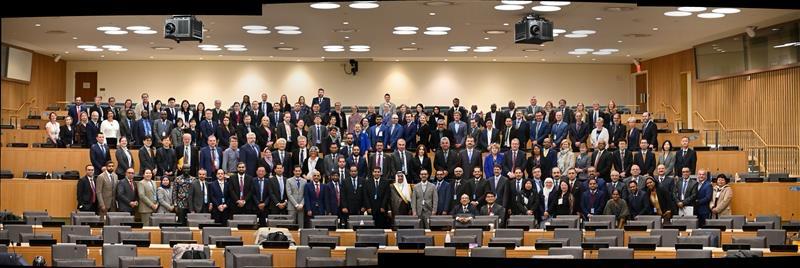In New York, IBGE participates in meeting of the United Nations Group of Experts on Geographical Names
May 28, 2025 09h03 AM | Last Updated: May 29, 2025 12h41 PM

The Brazilian Institute of Geography and Statistics (IBGE) participated, between April 28 and May 02, in the 2025 Session of the United Nations Group of Experts on Geographical Names (UNGEGN, in English), organized by the United Nations (UN) in New York. Ana Cristina da Rocha Berenger Resende, head of the Geographical Names Department, within the Division of Cartography, was the IBGE representative in the meeting whose focus was the Geographical names standardization through inclusive, culturally informed and evidence-based solutions to support sustainable development.
The meeting had as its main objective to be a forum where experts come together to learn and share best practices and norms, new developments in geographical names administration and standardization. The session also highlighted their role in the preservation of cultural heritage and in the support of relevant aspects of the 2030 Agenda for Sustainable Development, besides creating a platform to explore how inclusive, culturally informed and evidence-based solutions are being used by Member States to reach their objectives and support Sustainable Development Goals.
The head of the Geographical Names Department, Ana Cristina da Rocha, highlighted that the IBGE has had considerably active participation in the Group, where she holds a rapporteur position, representing Brazil in the Presidency of Portuguese Language Countries. The Deputy Manager and the Manager of Geographical Names (DGC/CCAR) represent the country in the Latin American Division as the main and second representatives, respectively.
“As this event refers to discussions related to geographical names activities, encompassing all the steps in standardization and dissemination, where resolutions and recommendations that guide the work with geographical names in the IBGE stem from, the interchange of information and experiences shared in the event lead to the update and increase of knowledge about the topic, and reflects the improvement of products in our Institute.”
Ana Cristina da Rocha, also explained that he active participation of Brazil in cooperation with other countries within the Divisions can improve and facilitate the national standardization of geographical names, besides increasing the visibility of Brazil and of the IBGE in the scenario of international standardization of geographical names. “That increases our chances of attracting international investments and partnerships to the IBGE projects. ”
Among the topics of the Strategic Plan and Programme of Work 2021–2029 of the Expert Group that were discussed in the Session are: names of places to support sustainable development, management of toponymic data and gazetteers (a geographical dictionary used to identify and find specific places), romanization systems, diversity and inclusion, capacity Building in toponymics and geographical names as part of cultural heritage.
IBGE Geographical Names Data Collection Manual
The head of the Geographical Names Department of the IBGE Cartography Division, Ana Cristina da Rocha participated in the panel session of Geographical Names as Cultural Heritage, where she spoke about the IBGE Geographical Names Data Collection Manual, released in July 2023, which was given highlight during the discussion of the topic Technology, innovation and norms, within the National Dialogue, when selected countries present initiatives related to topics in the event Schedule.
Ana Cristina da Rocha explained that the Manual was well received due to its comprehensive description of data collection and to the focus in preservation of cultural heritage through the work with geographical names. “Also considered positive was the way that focus results in flexibility of the method presented, not depending on the use of digital tools, accessibility of language, allowing application by minority groups and traditional communities, regardless of the level of schooling of members, even in school environments, with limited financial resources.”



















